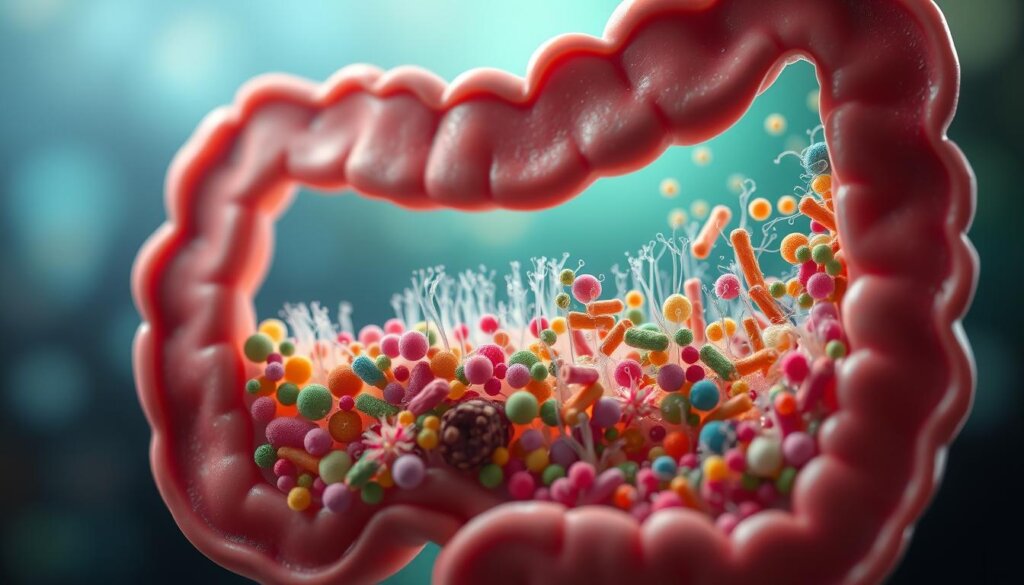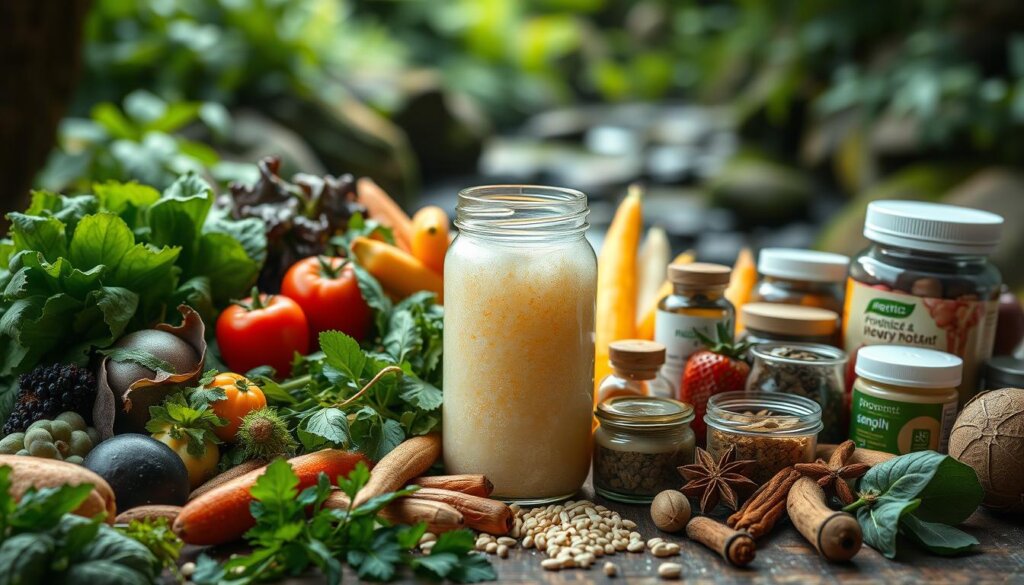How do you flush bad bacteria from your gut? Tips & Advice
Did you know there are 10 times more bacterial cells in your body than human cells? This invisible ecosystem in your digestive system, called the microbiome, influences everything from nutrient absorption to mental health. When balanced, these trillions of microorganisms act as silent partners in wellness—but imbalances can trigger conditions like obesity, diabetes, and even mood disorders.
The gut’s microbial community helps process food, defend against pathogens, and regulate immunity. Research shows that over 70% of the immune system resides in the gut, making its health critical for disease prevention. However, factors like poor diet or stress can disrupt this delicate balance, allowing harmful bacteria to thrive.
Restoring harmony doesn’t require extreme measures. Simple dietary tweaks, probiotics, and lifestyle changes can shift microbial populations within days. This guide explores science-backed strategies to support your gut’s natural defenses and improve overall well-being.
Key Takeaways
- Your gut contains trillions of microbes that outnumber human cells 10-to-1
- A balanced microbiome supports immunity, digestion, and mental health
- Harmful bacteria overgrowth links to chronic diseases like diabetes
- Diet and probiotics can reshape gut flora faster than previously thought
- Over 70% of immune function originates in the digestive system
Understanding the Gut Microbiome and Its Impact on Health
Imagine a bustling city inside your digestive tract, home to 100 trillion microorganisms working around the clock. This gut microbiome acts like a living shield, protecting your body while breaking down food and synthesizing nutrients. Its balance directly shapes immunity, energy levels, and even emotional stability.

What Is the Gut Microbiome?

Click to LEARN MORE
Composed of bacteria, fungi, and viruses, this ecosystem thrives in the intestines. Research confirms these microbes regulate digestion, produce vitamins like B12, and neutralize toxins. When harmful strains dominate—a state called dysbiosis—they trigger inflammation linked to autoimmune disorders and metabolic conditions.
How Gut Health Affects Overall Well-Being
The gut communicates with the brain through the vagus nerve, influencing mood and cognitive function. Nearly 80% of immune cells reside here, constantly screening threats. Poor microbial diversity often correlates with fatigue, skin issues, and food sensitivities.
Surprisingly, dietary shifts can transform gut bacteria in just 72 hours. Fiber-rich meals fuel beneficial strains, while processed foods feed harmful ones. Timing matters too—late-night eating disrupts the microbiome’s natural circadian rhythm, much like irregular sleep affects humans.
For those managing digestive issues, targeted probiotics can help restore equilibrium. Studies show balanced microbiota improve nutrient absorption and reduce bloating, creating a ripple effect on energy and immunity.
Strategies for Flushing Bad Bacteria from Your Gut
Balancing your internal ecosystem starts with smart choices that reshape microbial populations. Research reveals dietary patterns and daily habits directly influence which bacteria dominate your digestive system.

Dietary Adjustments to Starve Harmful Bacteria
Processed snacks and sugary drinks act like fertilizer for undesirable microbes. Studies show diets heavy in refined sugars reduce beneficial Bifidobacterium by up to 40% while promoting inflammatory strains. Three key changes make a difference:
- Swap white bread and pastries for whole grains and legumes
- Limit added sugars to under 25g daily (about 6 teaspoons)
- Include prebiotic-rich foods like garlic and bananas
A 2021 review found athletes’ high-fiber diets supported 30% greater microbial diversity than sedentary individuals. For those managing bloating, specific probiotics can accelerate improvements.
Lifestyle Modifications for Better Digestion
Physical activity does more than burn calories—it reshapes gut communities. Just 30 minutes of daily walking increases microbes that combat insulin resistance. Stress management matters equally:
- Practice deep breathing before meals
- Aim for 7-8 hours of sleep nightly
- Drink 2 liters of water daily to flush toxins
Chronic stress alters gut permeability within hours, allowing harmful substances into the bloodstream. Small, consistent changes create lasting shifts in digestive health and overall vitality.
How do you flush bad bacteria from your gut?
A three-day reset can transform your digestive landscape by starving harmful microbes and nourishing beneficial ones. Research shows dietary shifts work faster than previously believed—some changes appear within 72 hours. Start by eliminating processed meats, sugary snacks, and fried foods that feed undesirable strains.
Step-by-Step Methods for Gut Cleansing
The Mediterranean diet pattern offers a proven framework for microbial balance. A 2019 study found participants who adopted this approach doubled their Lactobacillus populations in three days. Follow this structured plan:
| Day | Focus | Key Actions |
|---|---|---|
| 1 | Elimination | Remove processed foods; drink 8 glasses of water |
| 2 | Rebuilding | Add 5+ vegetable servings and whole grains |
| 3 | Maintenance | Include fermented foods; continue hydration |
Hydration accelerates toxin removal—aim for 2 liters daily. Herbal teas count toward this goal and provide antioxidants. For sustained results, pair dietary changes with probiotics to amplify the health benefits of your reset.
Meal timing matters too. Finish dinners 3 hours before bedtime to align with the gut’s natural repair cycle. Most people notice reduced bloating and improved energy by day three when following this protocol consistently.
Incorporating Fermented Foods and Probiotics into Your Diet
Revitalizing your digestive system starts with smart dietary choices that support beneficial microbes. Adding fermented items and targeted supplements creates an environment where good bacteria thrive, crowding out harmful strains naturally.
Benefits of Fermented Foods

Click to LEARN MORE
Traditional fermentation transforms everyday ingredients into digestion-boosting powerhouses. Items like yogurt, kimchi, and Malaysian tapai (fermented rice) deliver live cultures that enhance nutrient absorption. These foods often contain higher vitamin levels than their raw counterparts—a 2022 study showed fermented vegetables provide 34% more bioavailable iron.
Regular intake strengthens the gut lining, reducing inflammation linked to chronic conditions. For best results, aim for 1-2 daily servings from diverse sources like tempeh or kombucha.
Selecting Quality Probiotics
Not all supplements work equally. Look for products listing specific strains like Lactobacillus rhamnosus GG, proven to survive stomach acid. Opt for brands with 10-50 billion CFUs (colony-forming units) and third-party testing seals.
Pair probiotics with prebiotic-rich fruits and vegetables for amplified benefits. Storage matters too—refrigerated formulas often maintain potency better than shelf-stable options. Always consult healthcare providers when starting new regimens, especially for sensitive systems.
FAQ
Can diet alone improve gut bacteria balance?
While diet plays a major role, other factors like stress management, sleep, and exercise also influence gut health. Eating fiber-rich foods, fermented items like kimchi or kefir, and reducing processed sugars support a healthier microbiome. For lasting results, combine dietary changes with lifestyle adjustments.
How long does it take to restore gut health?
Results vary, but many people notice improvements in digestion within 2–4 weeks. Consistency is key—regularly consuming prebiotic foods, staying hydrated, and avoiding inflammatory triggers like excess alcohol or artificial sweeteners can accelerate progress.
Are probiotics necessary for gut cleansing?
Probiotics (e.g., yogurt, sauerkraut, or supplements like Align®) help replenish good bacteria, but they’re not the only solution. Pairing them with prebiotic foods like garlic, oats, or apples feeds beneficial microbes. Always consult a doctor before starting new supplements.
Does exercise impact gut bacteria diversity?
Yes! Studies suggest regular physical activity, even brisk walking for 30 minutes daily, promotes microbial diversity. Exercise reduces inflammation and supports digestion, creating a friendlier environment for good bacteria to thrive.
Can stress harm the gut microbiome?
Chronic stress disrupts the gut-brain axis, altering bacterial balance. Practices like meditation, deep breathing, or yoga can mitigate this. Prioritizing sleep and mindfulness helps maintain a resilient digestive system over time.
What foods should be avoided to reduce bad bacteria?
Limit sugary snacks, refined carbs, and processed meats, which feed harmful microbes. Artificial additives and trans fats in fried foods may also worsen imbalances. Opt for whole foods like leafy greens, berries, and lean proteins instead.
Are there risks to extreme gut-cleansing methods?
Aggressive detoxes or prolonged fasting can strip beneficial bacteria and cause nutrient deficiencies. Gentle approaches—like increasing fiber intake gradually or trying elimination diets under medical supervision—are safer and more sustainable.

Khloe Tan
Khloe Tan is a Certified Nutritionist, Corporate Wellness Trainer, and Holistic Health Specialist with over 15 years of experience in the health and wellness industry. She has delivered more than 100 talks nationwide, inspiring and educating diverse audiences on nutrition, lifestyle, and sustainable wellness. Her work has positively impacted over 3,000 lives, and she continues to champion holistic approaches to well-being in both corporate and personal settings.
Feature Product
-
Hydrogen Water FIlter/Generator
H2zen Portable (White/ Blue)
RM2,600.00 Add to cart Buy NowRated 0 out of 5





